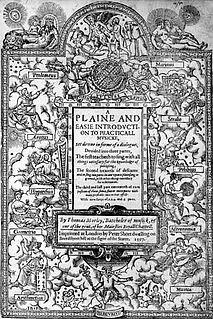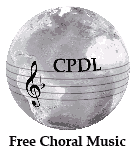Related Research Articles

John Dowland was an English Renaissance composer, lutenist, and singer. He is best known today for his melancholy songs such as "Come, heavy sleep", "Come again", "Flow my tears", "I saw my Lady weepe" and "In darkness let me dwell", but his instrumental music has undergone a major revival, and with the 20th century's early music revival, has been a continuing source of repertoire for lutenists and classical guitarists.
Cristofano Malvezzi was an Italian organist and composer of the late Renaissance. He was one of the most famous composers in the city of Florence during a time of transition to the Baroque style.

Thomas Morley was an English composer, theorist, singer and organist of the Renaissance. He was one of the foremost members of the English Madrigal School. Referring to the strong Italian influence on the English madrigal, Philip Brett and Tessa Murray state that Morley was 'chiefly responsible for grafting the Italian shoot on to the native stock and initiating the curiously brief but brilliant flowering of the madrigal that constitutes one of the most colourful episodes in the history of English music'.
John Wilbye was an English madrigal composer.

Ernest Roland Ball was an American singer and songwriter, most famous for composing the music for the song "When Irish Eyes Are Smiling" in 1912. He was not himself Irish.
Richard Al(l)ison was an English composer. He wrote de la Tromba, a fine broken consort piece which has several professional recordings and first became well known due to the Julian Bream Consort.

Richard Dering — also Deering, Dearing, Diringus, etc. — was an English Renaissance composer during the era of late Tudor music. He is noted for his pioneering use of compositional techniques which anticipated the advent of Baroque music in England. Some of his surviving choral works are part of the repertoire of Anglican church music today.
"Flow, my tears" is a lute song by the accomplished lutenist and composer John Dowland (1563–1626). Originally composed as an instrumental under the name "Lachrimae pavane" in 1596, it is Dowland's most famous ayre, and became his signature song, literally as well as metaphorically: he would occasionally sign his name "Jo. Dolandi de Lachrimae".
"I Saw My Lady Weepe" is a lute song from The Second Book of Songs by Renaissance lutenist and composer John Dowland. It is the first song in the Second Book and is dedicated to Anthony Holborne. It is an example of Dowland's use of chromaticism.
The Second Book of Songs is a book of songs composed by Renaissance composer John Dowland and published in London in 1600. He dedicated it to Lucy Russell, Countess of Bedford.
John Amner (1579–1641) was an English composer.

"Come Again, sweet love doth now invite" is a song by John Dowland. The lyrics are anonymous. The song is bitter-sweet, typical of Dowland who cultivated a melancholy style.

Lachrimæ or seaven teares figured in seaven passionate pavans, with divers other pavans, galliards and allemands, set forth for the lute, viols, or violons, in five parts is a collection of instrumental music composed by John Dowland. It was published by John Windet in London in 1604 when Dowland was employed as lutenist to Christian IV of Denmark. The publication was dedicated to Anne of Denmark.
In darkness let me dwell is a song ascribed to the lutenist and composer John Dowland. Published in 1610, late in Dowland's career, the song shows the influence of Italian music of the early baroque. It was published in "A Musical Banquet," a 1610 anthology of songs for lute and voice from England, France, Italy, and Spain compiled by Robert Dowland, John's son. In darkness let me dwell has been recorded by many artists, notably by Sting and Edin Karamazov.
Mogens Pedersøn was a Danish instrumentalist and composer. He is considered the most important Danish-born composer before Buxtehude.
Thomas Greaves was an English composer and lutenist.

Psalm 13 is the 13th psalm of the Book of Psalms, generally known in English by its first verse, in the King James Version, "How long, O Lord". The Book of Psalms is the third section of the Hebrew Bible, and a book of the Christian Old Testament. In the Greek Septuagint version of the bible, and in its Latin translation in the Vulgate, this psalm is Psalm 12 in a slightly different numbering system. In Latin, it is known as "Usquequo Domine".

Psalm 134 is the 134th psalm from the Book of Psalms, generally known in English by its first verse in the King James Version, "Behold, bless ye the LORD, all ye servants of the LORD". The Book of Psalms is part of the Hebrew Bible and the Christian Old Testament. It is Psalm 133 in the slightly different numbering system of the Greek Septuagint and Latin Vulgate versions of the Bible. Its Latin title is "Ecce nunc benedicite Dominum". It is the last of the fifteen Songs of Ascents, and one of the three Songs of Ascents consisting of only three verses.
References
- ↑ "John Bennet- Bio, Albums, Pictures". Naxos Classical Music . Retrieved 30 March 2017.
- ↑ Bennet, John (1599). Madrigalls to Fovre Voyces (images from the 1845 reprint). musopen.org . Retrieved 31 March 2017.
- ↑ Aloritias, Karl (1 June 2010). "Weep, O Mine Eyes". Karl's Choral Music Webpage.
- ↑ Brown, David. "John Bennet (i)". Grove Music Online . grovemusic.com (subscription access).Missing or empty
|url=(help) - ↑ markfromireland (29 September 2015). "John Bennet (±1575–1614): Weep, o mine eyes [The Cambridge Singers – John Rutter]". Saturday Chorale.

